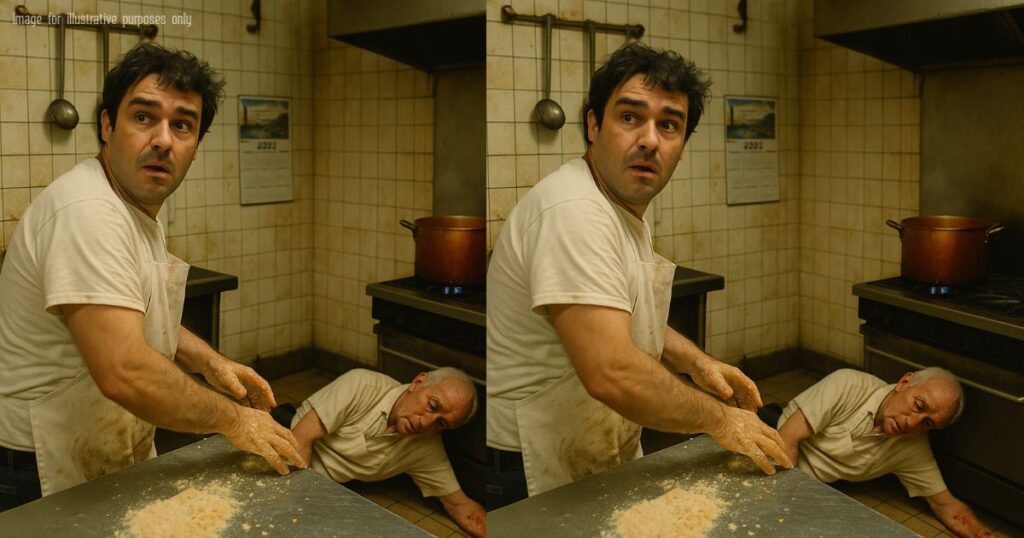But not everything old stays in the past.
Sometimes, it walks back through your front door in a weathered jacket.
I found myself reading that notebook every morning. The handwriting faded a little more each week, but the words stayed sharp.
It’s only a short trip.
Feed people.
Love them.
That’s it.
I started writing things, too. Little notes. Not recipes—those lived in my hands—but stories. Things Pop said. Things Grandpa did. Like the time he sold a full tray of lasagna for five bucks because the buyer was a single mother with a colicky baby.
Or the time he fixed a broken heater in the dead of winter using a bread pan and chewing gum.
No one taught me how to write down legacy.
So I wrote it like a cook writes: messy, quick, full of grease and hope.
One morning, the man in the Army jacket returned.
Same booth. Same slow steps.
He looked older than I remembered. Or maybe I just saw him clearer this time.
I brought him his Parm. Sat down across from him.
“I never got your name,” I said.
He paused, then smiled. “Ralph.”
“Did you really mean what you said? That my father saved you?”
He didn’t answer right away. Just looked out the window, like the story was playing on glass.
“I got back from ‘Nam in ‘75,” he said. “I wasn’t right. The VA was backed up. My folks were gone. No money, no work. One night, I ended up on Bloomfield, starving, shaking. Smelled the sauce from across the street.”
He looked down at the plate. “Your father didn’t judge me. He didn’t ask questions. Just gave me this. Told me, ‘Eat. The world’s ugly, but the sauce is honest.’”
I swallowed hard.
Ralph wiped his mouth and stood. “I just wanted to tell you again. That plate… that man… they made me believe there was still good in the world.”
He turned to leave. But this time, I stopped him.
“Ralph. Can I take your picture?”
He looked surprised. But nodded.
I snapped it with the old Polaroid we kept behind the counter.
I pinned it to the corkboard near the kitchen.
Underneath, I wrote: “The man who remembered.”
Years passed.
The town kept changing. Vape shops came and went. Amazon vans replaced mailmen. Kids took selfies outside like they were in some famous movie scene.
But Vito’s stayed.
We added nothing. We took away nothing.
One plate of chicken Parm, every Tuesday, always free.
Some weeks it went untouched. Other weeks, two people showed up, both equally lost. We fed them both anyway.
The local paper did a story on it once. Called it “The Tuesday Table.”
Said it wasn’t just a restaurant anymore.
Said it was a place where people still believed in neighbors.
Last winter, I found myself slowing down. Knees ached. Hands stiff. I had a tremor I couldn’t shake. The kind Pop used to hide behind a towel.
My daughter, Maria, started coming by more. At first just to help. Then to learn.
One morning, I handed her the tongs and said, “It’s time you knew the Parm.”
She smiled, nervous. “I thought I already knew it.”
“You know the steps. But not the soul.”
We cooked side by side. Like Pop and I once did. She got the thickness wrong on the first slice. I didn’t yell. I just smiled and showed her again.
She grated the cheese. I handed her the ricotta.
“This is scandal,” I said.
She laughed. “Scandal?”
“You’ll understand when you taste it.”
When she plated it, I watched her hands. Strong. Steady. Full of love.
She served it to a quiet teenager with scuffed shoes who came in alone that day. No words. Just hunger.
He took one bite, closed his eyes, and exhaled like he hadn’t eaten in days.
That’s when I knew: she had it.
The heart. The instinct. The calling.
That night, she found the notebook. My scribbles, Pop’s words, our greasy little gospel of goodness.
She read it like a prayer.
It’s only a short trip.
Feed people.
Love them.
That’s it.
She looked up at me and said, “I want to keep it going.”
I nodded.
And for the first time in a long time, I went home early.
These days, I mostly sit in the booth by the window. I drink espresso. I smile at the old neon sign flickering through the steam.
Some customers don’t know who I am.
They call me “the guy who’s always here.”
That’s fine.
Sometimes I still slip behind the line and stir the sauce. Just for the smell of it.
Sometimes I write little notes on napkins and tuck them into the silverware rolls.
Things like:
“You’re not forgotten.”
“It’s okay to need help.”
“There’s love in this dish.”
I don’t sign them.
They don’t need my name.
Last week, Maria served a man who walked in barefoot, holding a dog leash with no dog on it.
He looked lost. Ravaged. He didn’t speak. Just sat.
She brought him a plate.
I watched from the booth as he took the first bite.
His shoulders dropped.
His lip trembled.
And I swear to you — I saw something come back into his eyes. Something soft. Something like memory.
Maria sat with him. Talked soft. Listened.
And in that moment, I saw every man in my family, standing behind her.
Pop with his spoon.
Grandpa with his cigar.
Me with my shaking hands.
All of us — still feeding people.
Still loving them.
Still making the short trip count.
💬 Final Note (for sharing):
If this story reminded you of your father, your daughter, or a time when a simple meal meant more than words — share it. Someone out there might be hungry for more than food.


